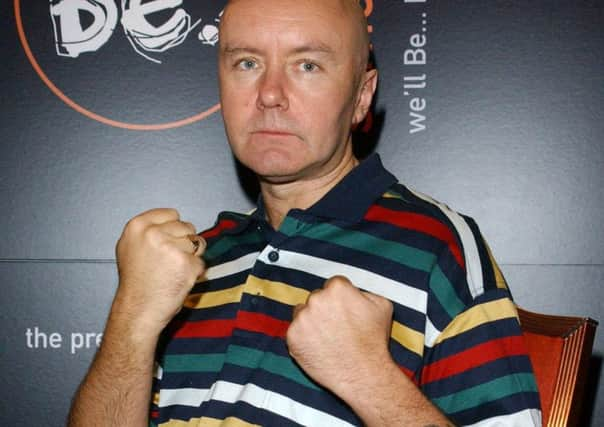From the archives: Tom Adair reviews Trainspotting by Irvine Welsh


Trainspotting
by Irvine Welsh
Secker & Warburg, £8.99
Imagine Pinter’s hell in the cave of Beckett’s null, staged in a toilet, the porcelain gleam on the unlit stage: Tape’s Last Krapp, brimming over, an infinite excremental moment, a scream of defiance, disgust, delight; the drip of the tap, its soft intermittence. A hand emerges from the bowl.
Irvine Welsh’s debut novel invites you to sniff beneath the fingernails, read the graffiti, encounter c**t as a term of endearment. This is Edinburgh, Hyde-bound, in the middle of the hopeless, degenerate, suppurating present with buskers called Rent Boy, Begbie, White Swan, Sick Boy and Spud. Sometimes the heights of the ridiculous are mirrored by depths of need: shooting heroin “intae ma knob for the second consecutive day... (this) gig is getting sicker by the minute.”
Advertisement
Hide AdInjecting heroin into the genitals is an expression of desperation. Shootin’ smack, according to Begbie, “makes things seem mair real tae us... We develop aw they long-winded ideas which just interpret the reality ay oor lives in different ways, without really extending oor body ay worthwhile knowledge, about the big things, the real things. Basically, we live a short, disappointing life; and then we die.”
In this rare philosophical pause in a novel perpetually in a starburst of verbal energy - a vernacular spectacular - you might be waylaid by the notion that somehow this novel’s energy seeks a brilliant transformation into enlightenment, seeks to debate, to explore reality, chart (even stutter towards) “the big things”, fathom the essence of disappointment, explode the misleading, mythical “we”. For this book is a charter for the egoist, the solipsist. We do not die; dying, like living, like the shooting-up, the tuning-out, like the lucifer drop, is a thing we internalise. The body valved in spasm, falls alone.
This is underscored by the novel’s spree of voices, its ugly-fucklings, self-abusing, self-erasing, self-obsessed. And by the clever, funky, streetwise self-awareness of their delivery, their throwaway dalliance, their punctuated precision, perjinkly edited and spat in musical arcs of banter, invective, boast and transaction. Irvine Welsh is no voyeur. He writes from the shredded vein of experience, absenting himself ostensibly from the chorus. He is the novel’s choreographer, he underwrites the score.
Not so much a narrative as a series of interacting, punkish verbals, the stories we hear are retched from the gullet. Like Custer’s Last Stand, with on-site refreshments, they form a technicolour stream, a non-stop assault, dreading its endgame, abhorring a lull.
Every human orifice gets a plug, in more senses than one. Sex is an upper, providing the novel’s wittiest, sometimes sickest moments. Renton (Rent Boy), a Hibees fan, comes “off the boil”, staving off his climax with a nubile 14-year-old Dianna, by imagining “shagging... Wallace... Wallace Mercer.” “It was amazing, he decided, how things like sex and Hibs... suddenly became all-important. He speculated that his drug problems might be related to Hibs’ poor performances over the Eighties.” Limp excuses in both departments.
The book is heady but not addictive. All that “fetid pish”, the unsinkable turds, mixing the keek with chocolate sauce to serve up as dessert, the pub brawls, the heart attacks, the stroke, the syringe-like sex, the drugs, the opium suppositories, everything drifts like dreck into shot, then floats out of frame to be replaced by what at first seems a gamut of horrors, but then becomes a passing catalogue of attention-seeking items, a creaking conveyor belt of dispensables in the daily degeneration game.
Advertisement
Hide AdIt says a lot for Irvine Welsh’s fastidious eye for telling detail, his ear for the rhythm of demotic-poetic speech, and his fascination with his material, that I read to the final sentence. He keeps the long snarl on a tight, spiked leash. He is fascinated not least, one feels, with his own fascination, like someone watching themselves picking bogies, sprinkling scabs, a cult hors d’hoeuvre.
This book neither celebrates nor castigates the phenomena it describes; it is not the pornography of drugs that its hype might have led readers to believe. It is of course a current buzzbook among the publishing glitterati, as though the chattering baboons have captured a strange, exotic mutant, pressing it safely between the blotting papers of fiction. It is the irony of such novels, expressing effects without sharpening causes, that they are prey to those who would trail them into a sociological cul de sac for a mugging, sticking the footnotes in for good measure.
Advertisement
Hide AdIrvine Welsh, who writes with verve and amused intelligence, can subvert this cadaverous rate if his inward eye - as I think it will - proves to be detachable, proves it can catch in his next fiction foray the glint of Trainspotting’s absentee: the beguiling, overwhelming ecstasy of love.